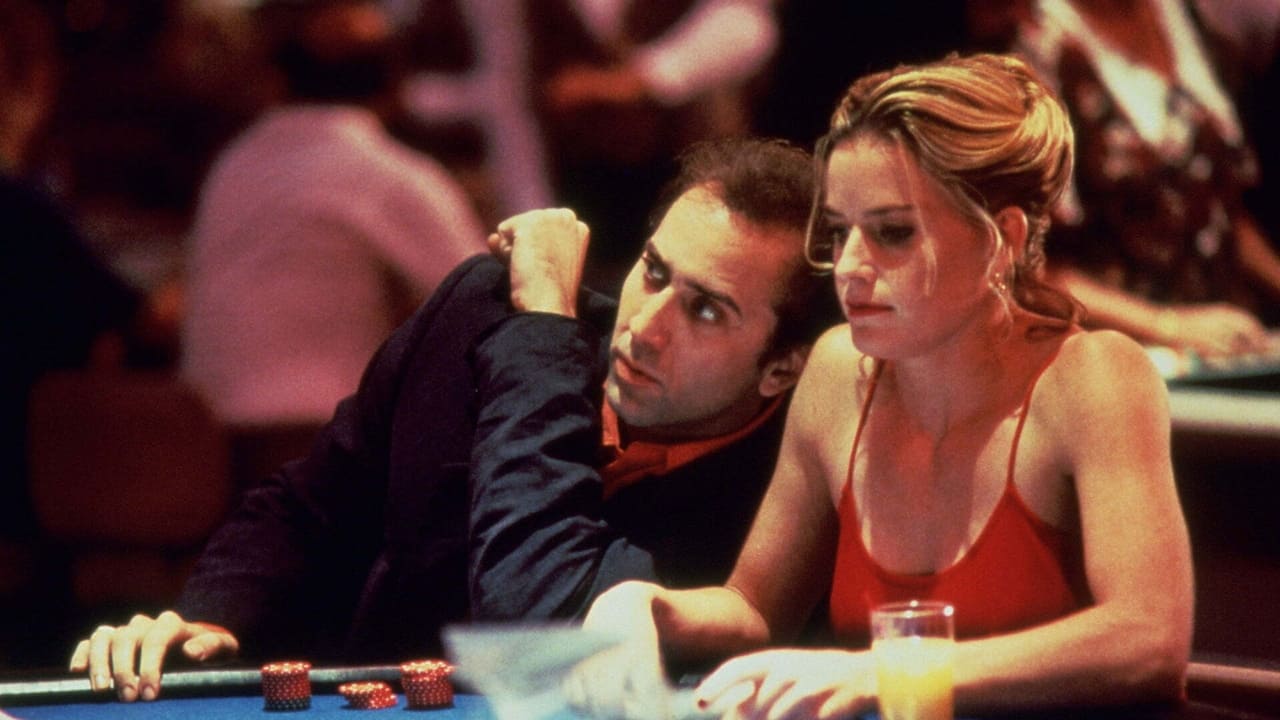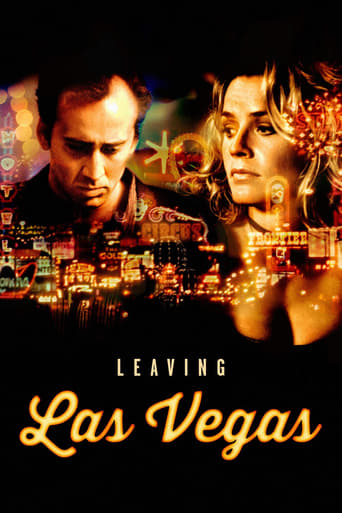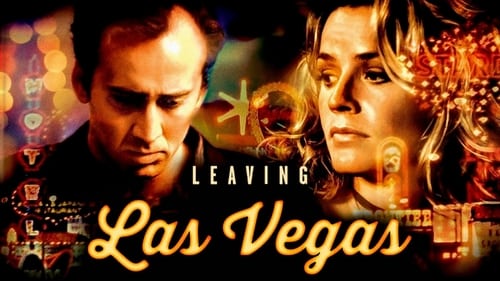



Am i the only one who thinks........Average?
This is a dark and sometimes deeply uncomfortable drama
View MoreWorth seeing just to witness how winsome it is.
Through painfully honest and emotional moments, the movie becomes irresistibly relatable
View MoreI have watched this movie at least3 times, hoping that at each viewing it will get better. It never does. It never truly captures me. I find it slow, dull, and depressing. Nicholas cage's performance is one note. Elizabeth Shue gives a much more complex and varied performance. Her performance is much better than the material. Cannot see why Nicholas Cage won the Oscar. A slow, over rated piece of Hollywood claptrap. A forgettable movie with no outstanding scenes or dialogue.
View MoreHollywood has made a lot of movies about Las Vegas. Iconic films like "Casino", "Ocean's Eleven", "21", and "The Hangover", immediately come to mind, conjuring up images of adventure and glamour in the dessert that have captivated the public's imagination for decades. But this is truly a misconception, because the money and glamour of Las Vegas often overshadows the gloomy underbelly that is equally a part of the reality of the city. While Las Vegas continues to be a place where people go to let loose, gambling addiction, substance abuse, and sexual violence also come with the package. This coupled with the isolating loneliness of the dessert, makes Las Vegas a genuinely grim place. "Leaving Las Vegas" is one of the few films about Las Vegas produced by Hollywood that capture the true contradictory nature of this gambling oasis. The film tells the story of a self-destructive alcoholic and a naïve escort who find comfort in each other to numb themselves from the pain of their lives. Nicolas Cage plays the alcoholic Hollywood screenwriter named Ben Sanderson who, after burning all of his bridges and losing his job, decides to move to Las Vegas to drink himself to death. In the opening scenes of the film, the extent of Ben's alcoholism is made blatantly self-evident when an out of control Ben chugs down a bottle of Vodka while driving next to a forgiving but judgmental police officer. During one particularly tragic moment, Ben drunkenly narrates to a young prostitute, "I don't know if I started drinking because my wife left me or my wife left me because I started drinking". The girl takes advantage of Ben's sorry state and proceeds to steal the man's wedding ring. Ben's love interest in the film has a story that is just as tragic. The female lead Sera, who is played by the Harvard alum Elisabeth Shue, is an escort who works for an abusive pimp at the Las Vegas Strip. After running afoul of eastern European mobsters, it is implied that Sera's pimp is murdered and Sera ends up running into Ben. By portraying the gloomy dark side of Las Vegas as the setting of this doomed love story, the film highlights the qualities of Las Vegas that are usually obscured by the ditzy lights and entertainment. Although the initial encounter between the two characters leaves much to be desired, eventually a charming if not doomed relationship forms as these two free-floating characters try to assuage the pain of their individual flaws. While charming, the film is simultaneously cruel because both the male and female leads have horribly self-destructive tendencies. This leaves the audience with the strange realization that the love affair between these two characters is doomed for failure. Yet, the movie tries to remain hopeful and one can't help but admire both the acting and on-screen chemistry between the two male and female leads.The greatest aspect of "Leaving Las Vegas" remains a subtle presence throughout the entire film. The grim nature of the story is hidden by the classical jazz and piano music as well as the upbeat soundtrack. The music is tastefully chosen to stand in deep contrast to the dark and grim nature of the circumstances of the two main leads. Perhaps the raw isolation of the dessert can bring anybody together. As an audience member, one can't help but wonder why these two self- destructive people are together. At one point the movie delivers an answer when the Sera admits says, "The only thing I have to come home to is a bottle of mouth wash to take the taste of cum out of my mouth. I'm tired of being alone. That's what I'm tired of". When one puts it like that, who isn't?
View MoreI have had this movie sitting in my library for sometime. I had it for two reasons: Nicolas Cage, and the fact that it won an Oscar. I didn't know there was Elisabeth Shue in it, or the reasons for my having this movie would have been three!And what a beautiful movie it is!Throughout its 1 hour and 48 minutes of running, I did not know where the time flew. A beautiful tale of two proud and graceful people who have been caught up in a rut of fate. An exquisite movie and something that make you feel better after watching it.However, there are certain drastic directorial and camera work issues: the camera often fails to focus on the subject in question. The booze glasses keep emptying or filling themselves up throughout the movie. I think the biggest of the goofs is that in the beginning when a hooker sucks Cage's wedding ring off his finger, and he discovers that when he wakes up, the ring is again on his finger afterwards.
View MoreUpon my first ever viewing (I know) of Mike Figgis's Leaving Las Vegas last night, I discovered that it's not the film I thought it was all these years. I had an image of a quirky, star crossed lovers tale with a modicum of sweetness. What I got wasn't insanely far off the mark, but I have to say I was disarmed and deeply affected by the sense of decaying bitterness which prevails throughout the story and hangs over it like the sour, neon stained moon over a feverish, perpetually nocturnal Vegas. Every character besides the two leads sort of flits dimly in and out of the story, never having any impact further than they need to service the plot with. This leaves Nicolas Cage and Elizabeth Shue eerily alienated and gives the movie a hypnotic flair. Even though these two abide in a bustling setting, it oddly seems at times that they are the only two human beings in existence. That also most likely stems from the film's willingness to take the time to get to know them, lingering on every glance, murmur and mannerism, be it mundane or essential, to try and get a feel for these two completely broken souls. Cage is Ben, a failing Hollywood screenwriter who is quite literally drowning in alcoholism, plagued by some tragic past of which we never learn about. He is fired and splits for Vegas to hole up in a motel and deliberately drink himself to death. There he meets Sera (Shue) a hooker with a heart of gold (Shue torches the cliché bravely). They are immediately attracted, and begin a relationship. She continues to see Johns, after being freed of her sadistic Latvian pimp (Julian Sands, terrifying). He makes her promise to not attempt to stop his drinking. Their romance is born out of the primal loneliness that each human being feels to a certain extent, that instinctual urge to reach out and grab for anything, anyone to put out the pain. Cage is everything in the role: pathetic, charming, sad, manic, desperate and deeply, scarily committed to his lethal quest of inebriation. The scenes of liquor consumption in this film go beyond excess and make Denzel in Flight look like a high schooler. It will make many uncomfortable, but looking away for our own peace of mind takes away from the urgency and dark poetry of Cage's situation. Booze is a low burn, but it's still suicide, and an agonizing method for anyone to behold in action: the person has an extended period of time to rethink, reevaluate, and if they don't, then their resolve is extended and far more disturbing than a split second decision. Cage displays this in harrowing form in a career highlight. Elizabeth Shue is heartbreaking as the girl who loves him but can't quite say why, a girl who has spent years in loveless copulation, confused and torn upon feeling it for the first time. Her character goes through some truly hellish things here. You will cry for her, fall in love with her alongside Cage and swell with admiration at her steely resilience in the face of some of the ugliest things life has to offer her. Each member of the supporting cast is like a star in the desert sky, a moment of flickering purpose before fading into the background again to let Cage and Shue continue their dance of the damned. Graham Beckel as a shaken bartender, Xander Berkeley as a cynical cab driver, Valeria Golino as as a Barfly and R. Lee Ermey as a taken aback conventioneer are all perfect. Director Mike Figgis composed the score himself, a moody blues melody that clings to your perception after the film like a dream that won't let go. Just to make the film more haunting, it's based on a novel by a severely alcoholic writer who took his own life two weeks after production was underway, furthering the disconcerting vibe to a saturation point. This one is a tough watch, and you'll be forced to see two human beings at the absolute end of the road, miles past rock bottom with seemingly no hope in sight. And yet, if you are patient and try to empathize, you will see the kind of flickering positivity and briefly life -affirming intimacy and light that humans cling to even in the darkest of times. Cage and Shue beautifully paint a bittersweet portrait of this through their work. It's overbearing with the better, but that makes the sweet all the more precious and lasting. Just watch something happy after.
View More